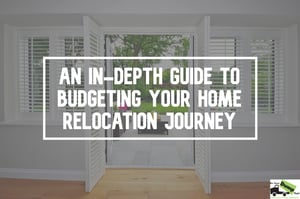
The idea of moving to a new state or city can be an exciting prospect. The actual process, however, can feel overwhelming, expensive, and sometimes, impossible. Planning ahead can save you a lot of time and energy and help you feel more organized and prepared for your big move.
If you’re planning a move or simply keeping your options open, use this guide to help you budget your way through your moving journey.
What Factors Affect Cost Of Moving?
While there are some variables that will fluctuate from year to year, other factors are much more predictable. Understand how distance, time of year, and the size of your household will impact your move before making any major decisions.
Traveling Distance
No matter how you move, you’ll need to get yourself, your family, and your belongings from point A to point B. While it may seem obvious that the cost of moving increases the more miles you travel, some buyers don’t consider this factor until the move is in progress.
Understand that the distance your traveling is directly proportionate to the amount of money you’ll spend and do your best to estimate these costs ahead of time with movers or moving truck rental companies.
Time of Year
Your real estate agent probably told you that the time of year can affect the price your home sells for. You probably didn’t know that the time of year can also impact the amount of money you’ll spend on moving. While it might seem like it would be more expensive to move in the wintertime, this is actually the most affordable time to move. Why? According to Updater, summer is actually the most popular season to move, making it the most expensive.
Keep this in mind when budgeting moving costs, so you don’t request a quote in the winter and get blindsided by a higher quote when you’re ready to move in July.
Household Size
The more people you’re moving (or the more items you own), the more expensive it will be to move. While this certainly includes moving furniture, belongings, people, and even pets, it also applies to vehicles and larger belongings, like boats.
In some cases, especially when moving long distances, it may be more inexpensive to sell heavy furniture, items you no longer want, or those that don’t fit your home’s new layout. This will put extra money in your pocket for buying new furnishings, if needed, and decrease your moving costs.
Moving Services: Professionals vs. Self Moving
Deciding whether you need professional help with your move is an important budgeting decision you should make early in the process.
While it can be difficult to figure out which route is more affordable for you, there are several questions you can ask yourself to help make the decision.
Do I want to drive to my new home?
If you aren’t up for long drives or road trips, the thought of driving hundreds of miles with a moving trailer hitched to your vehicle may sound daunting. Other people might love the idea of a road trip and decide this option makes sense for them. Either way, ask yourself if you have a preference, so you can start planning out your budget.
Do I have to make more than one trip?
If you’re moving a large household and will have to make more than one trip on your own (or moving several vehicles), it may be more cost-effective to hire movers to relocate everything all at once. If you decide to hire movers, be sure to also add transportation fees into your budget for air, train, or bus fare.
Do I have time to manage the moving process?
Many moving companies offer moving services like packing and will even insure your items. While some might not like the idea of other people packing up their belongings, others might be relieved knowing that this is one project they can cross of their list.
While letting a moving company handle your entire moving process will be more costly, if you don’t have the time or energy to do it on your own, it may be worth the extra spend. Figure out which route is right for you so you can get a quote and build it into your moving budget.
Storage Costs
If you’re moving in stages, combining households, or simply cannot bring all of your belongings at once, you’ll want to add storage fees into your budget.
Storage costs can be broken down into short term and long term expenses. Short term storage centers will charge you a monthly fee based on the square footage of the storage room. For this type of storage, you might not need to worry about climate controlled services or extra insurance for your items.
Long term storage, however, can be more costly, not just because you’re housing items for a longer period of time, but also because you might invest in more secure offerings and climate controlled units.
If you need to utilize any of these options, be sure to estimate the number of months required and factor this price into your moving budget.
Money-Saving Tips
While there’s no getting around spending money on a new move, there are many ways you can move affordably and save money during the process.
Pack smart
Moving and packing companies have a variety of fancy boxes specific to moving dishes, glasses, clothing, and other breakables. Rather than spend money on fancy packing materials, wrap cups and breakables in newspaper, towels, and clothing that you’re going to be moving anyway. Instead of paying for bulky clothing boxes, wrap trash bags around large bundles of hanging garments for the same effect.
Try using items around your house where you can to pack smartly and save money.
Try to downsize
If you’ve been considering downsizing, don’t wait until after you move to see what furniture fits. Instead, save on moving costs by selling anything you’re unsure you want to bring with you. Have a garage sale, list items on Craigslist or Facebook Marketplace, or throw out anything that’s no longer usable. You can rent a dumpster the size that you need.
Starting and Stopping Utilities
One expense many people forget about until the last minute is starting and stopping utilities in their residences. Depending on when you’re moving, you might be able to turn off your utilities ahead of your move. If you’re moving in the summer, however, you’re probably going to want to pay for the air conditioning during moving day.
Think ahead to decide the best times to start utilities at the new residence and cut off utilities at your old so you aren’t wasting money or left wishing you had water or electricity.
Software to Track Your Budget
The best way to manage your budget is to make sure you have all expenses and estimates listed in on place.
Software like YNAB (You Need a Budget) and Mint offer free solutions to manage expenses, while software like Quickbooks will offer more detailed expense tracking capabilities for under $20 a month.
You can also use Google Sheets or Excel to track expenses manually and to share them with your significant other or roommates. Lastly, your bank may offer online banking features to allow you to manage moving expenses or flag them for easier tracking.
About the author: Chris Milko is an avid real estate investor and a Content Associate at Clever Real Estate, a real estate startup offering flat fee commissions for home sellers. Visit the Clever Real Estate Blog to find all the latest information for home buyers and sellers.

